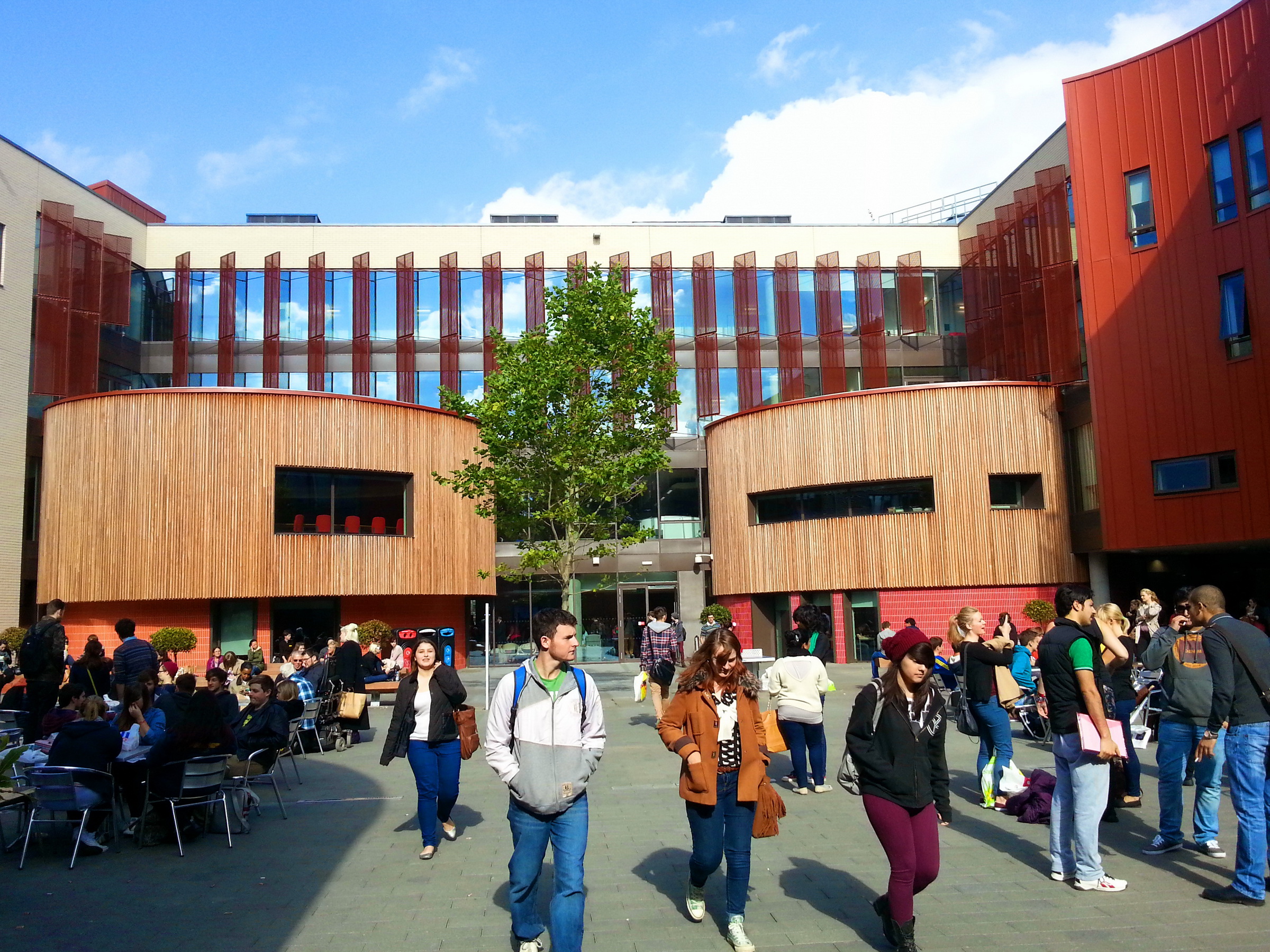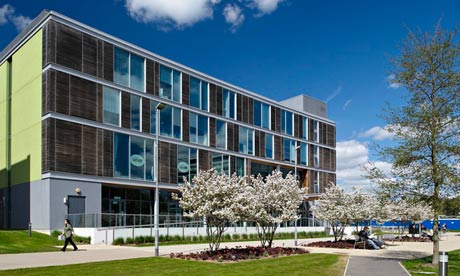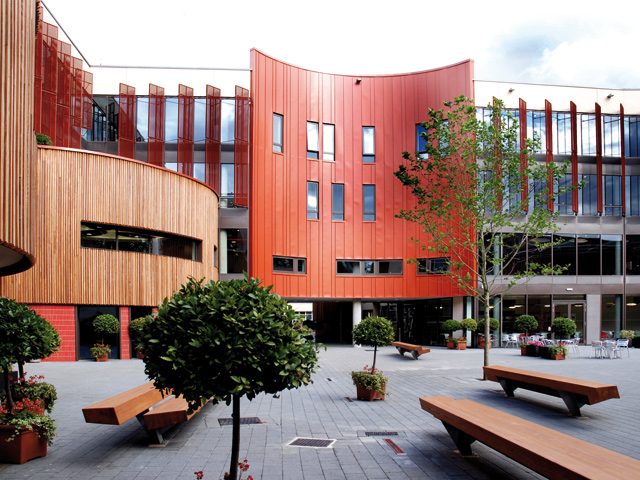Anglia Ruskin University was awarded university status in 1992. Today, with a student population of 31,000, we are one of the largest universities in the East of England, and a large provider of part-time education.
Our students are on courses leading to undergraduate and postgraduate degrees, as well as to a range of professional qualifications. In addition to being one of the most significant suppliers of nurses and teachers to the professions, we offer an ever expanding range of contemporary courses designed to meet the needs of the individual and the requirements of a knowledge-based economy.
Our main campuses at Cambridge and Chelmsford attract students not only from the East of England but in increasing numbers from mainland Europe and from further afield. In addition, our University has an extensive network of contacts with institutions throughout the world, delivering courses in countries as far removed as Malaysia and Trinidad.
In terms of vision and values we seek to build our reputation on the following:
Vision
· We are passionate about the advancement of knowledge and the education of students.
· We take university education in imaginative new directions.
· We are important to the region and want to be viewed in the UK and internationally as exceptional.
· Our key contribution is to the enhancement of social, cultural and economic wellbeing.
Specifically, we are working to ensure that:
· More than 90% of our students will succeed, be satisfied, and will recommend us to a friend.
· The Destination of Leavers from Higher Education (DLHE) Survey will report that 95% of students are in work or further study six months after leaving us; our graduates' earnings will match average graduate earnings; and 7% of students will leave us to start their own businesses.
· All judgements of our academic quality and reputation show continuous improvement and at least 95% of all external assessments are positive, including those of Professional, Statutory and Regulatory Bodies.
· Every member of academic staff will be engaged in research or current professional practice in their academic discipline.
· Our Research Institutes (The Childhood and Youth Research Institute; The Cultures of the Digital Economy; The Institute for International Management Practice; The Postgraduate Medical Institute; and the Global Sustainability Institute) will have national recognition.
· More than 90% of staff will find their work satisfying, will recommend working here to friends or family, and will receive job-related training and development each year.
· Students will use the Virtual Learning Environment (VLE) on a daily basis, sustainability will be a feature of their experience, and most full-time campus students will be involved in activity outside the academic curriculum.
· To enable our academic programme to be administered and delivered affordably at home and abroad, face-to-face and online, we will maximise its efficiency through the use of student and staff friendly online systems. We shall strive to exceed national and sector benchmarks for the sustainability of our buildings and processes.
· We will become a leading UK provider of Professional Doctorates, work-based learning and the Accreditation of Prior Learning.
· 20% of our campus-based students are from outside the EU and we educate an equal number of students both on-site and off-site.
· 20% of our activity worldwide will be at postgraduate level and we will award at least 50 PhDs across at least 10 disciplines each year.
· The number of organisations we work with will grow by 5% a year, as will our external commercial earnings, while profitability will remain at least at 10%. We will mainstream our not for profit sector development work and expand activity in this area so as to become a recognised centre of excellence.
· Establish a Business Innovation Centre ( to support the growth of new businesses based on ideas emanating from both inside Anglia Ruskin University and in the broader community we serve) which we manage and for which we provide academic support.
· We will investigate, and if feasible, establish a 'Med Tech Campus' in Essex, a Science Park which uses its connections with Anglia Ruskin University ( particularly the Postgraduate Medical Institute) to attract local and international businesses to relocate to Essex because of the supply of high quality graduates and our related research base.
· We will increase our engagement with local communities, including those associated with our international partnerships.
Values
· A sense of belonging. We are proud to be part of Anglia Ruskin University. We know that lifelong relationships are formed here.
· Academic ambition. We want our teaching and research to be excellent. We are determined that our students and staff will realise their full potential.
· Innovation. We are purposeful, challenging and curious about our world. We are prepared to do things differently. We are creative, entrepreneurial and bring enthusiasm to everything we do.
· Supporting each other. We are friendly and inclusive, and celebrate individuality and diversity. We support and encourage everyone, and strive hard to anticipate and meet needs and aspirations.
· Honesty and openness. We operate with integrity, trust and respect for each other and we deliver on our promises. We share ideas, information and challenges and we seek out views and opinions.
· Concern for the environment. We want our concern for a sustainable environment to inform every aspect of what we do.
Faculty of Arts, Law and Social Sciences
Faculty of Health, Social Care & Education
Lord Ashcroft International Business School
Faculty of Science & Technology
Undergraduate bachelor degrees
· IELTS 6.0 or equivalent, with nothing lower than 5.5 in any of the four elements (listening, speaking, reading and writing).
Postgraduate Masters degrees
· IELTS 6.5 or equivalent, with nothing lower than 5.5 in any of the four elements (listening, speaking, reading and writing).
Research degrees
· IELTS 6.5 or equivalent, unless a higher IELTS score is required for study at undergraduate or postgraduate level in that subject area.
Accepted equivalents to IELTS
· Cambridge: CAE Grade C or FCE Grade A/B
· Pearson: 59
Courses requiring IELTS 5.5 or equivalent
The following courses offer year 1 entry at IELTS 5.5, provided you undertake additional compulsory free English language modules in your first year.
· BA (Hons) Computer Games and Visual Effects
· BA (Hons) Creative Music Technology
· BA (Hons) Criminology
· BA (Hons) Criminology and Sociology
· BA (Hons) Drama
· BA (Hons) English Language Studies
· BA (Hons) Fashion Design
· BA (Hons) Film and Television Production
· BA (Hons) Fine Art
· BA (Hons) Graphic Design
· BA (Hons) History
· BA (Hons) Illustration
· BA (Hons) Illustration and Animation
· BA (Hons) Interior Design
· BA (Hons) International Business English
· BA (Hons) Music
· BA (Hons) Performing Arts
· BA (Hons) Philosophy
· BA (Hons) Photography
· BA (Hons) Popular Music
· BA (Hons) Public Service
· BA (Hons) Sociology
Courses requiring IELTS 6.5 or equivalent
· BSc (Hons) Abnormal and Clinical Psychology
· BA (Hons) Christian Theology
· BA (Hons) Early Childhood Studies (to include 6.5 in the IELTS Writing component)
· BA (Hons) Education
· BA (Hons) English Language and English Language Teaching
· BA (Hons) English Language and Linguistics
· BA (Hons) Film and Media Studies
· BA (Hons) Film Studies
· LLB (Hons) Law
· BA (Hons) Media Studies
· BOptom (Hons) Optometry
· BSc (Hons) Psychology
· BSc (Hons) Psychology and Criminology
Courses requiring IELTS 7.0 or equivalent
· BA (Hons) Drama and English Literature
· BA (Hons) English Literature
· BA (Hons) Philosophy and English Literature
· BA (Hons) Writing and English Literature
· BA (Hons) Writing and Film Studies
The International Merit Scholarship
The International Merit Scholarship scheme provides awards of either £500 or £1,000 to well-qualified students applying for any full-time Bachelors or Masters course. In some countries we offer a laptop alternative. Awards are made on the basis of academic merit and level of competence in English language. Once you apply for a course at Anglia Ruskin you will be automatically considered for a scholarship, and details of any award given will be included in your offer letter.
International Alumni Scholarship
This scholarship of £1,000, deducted from the tuition fee, is if you are an Anglia Ruskin University undergraduate student who is progressing to an Anglia Ruskin postgraduate course, or if you are an Anglia Ruskin University alumnus who wishes to return to our University to undertake a postgraduate course of study.
Transfer Scholarship
If you are a student transferring from a partner institution with which we have a specific co-operation agreement you may receive a £1,000 transfer scholarship as a reduction on your tuition fees.
MBA in Chelmsford Scholarship
UK, EU and international applicants who received an offer to study a full-time MBA in Chelmsford in September 2014 will be eligible to apply for a £3,000 scholarship.
Numbers of scholarships are strictly limited, so you will be subject to competitive selection.
GREAT Scholarship
This scholarship is delivered in partnership with the British Council in India. It s designed to support 20 Indian students who are residents in India and seeking to study an undergraduate programme at Anglia Ruskin University.
This scholarship will be applicable only to your first year of study. The course must be from an approved list (please check the terms and conditions, below). Each successful student will be awarded £2,000. There will be a maximum of 20 awards.
Sports scholarships
Anglia Ruskin offers selective sports scholarships and bursaries to students of high sporting potential enrolled on our academic programmes. Awards range from £500 to £1,000 per year, and are available in a variety of sports including cricket, rowing, athletics and swimming.
The British Chevening Scholarship
The University participates in this Foreign and Commonwealth Office-funded scheme and will accept up to ten Chevening Scholars per year on to full-time postgraduate degrees. The Scheme is administered through participating British Council offices in a range of countries. All enquiries should be addressed to the main British Council office in your home country.
Commonwealth Shared Scholarship
This is a full scholarship for selected Masters courses. We offer this to one student per year, for one of the following Masters courses:
· Healthcare Management
· Hospital Management
· International Relations
· International Social Welfare and Social Policy
· Public Health
· Town Planning.
All applicants for this scholarship will need to first apply for admission to the University as a postgraduate student and then submit a separate electronic application for the Commonwealth Shared Scholarship via the Commission's Electronic Application System.
Full-time International Undergraduate Fees: http://www.anglia.ac.uk/ruskin/en/home/study/international/fees/full_time_tuition_fees_2014_15.Maincontent.0004.file.tmp/ARU-International-UG-fees-2014-06-06.pdf
Full-time International Postgraduate Fees: http://www.anglia.ac.uk/ruskin/en/home/study/international/fees/full_time_tuition_fees_2014_15.Maincontent.0005.file.tmp/ARU-International-PG-fees-2014-05-01.pdf



2014 © a2fairs. All Rights Reserved. powered by twopulse.com